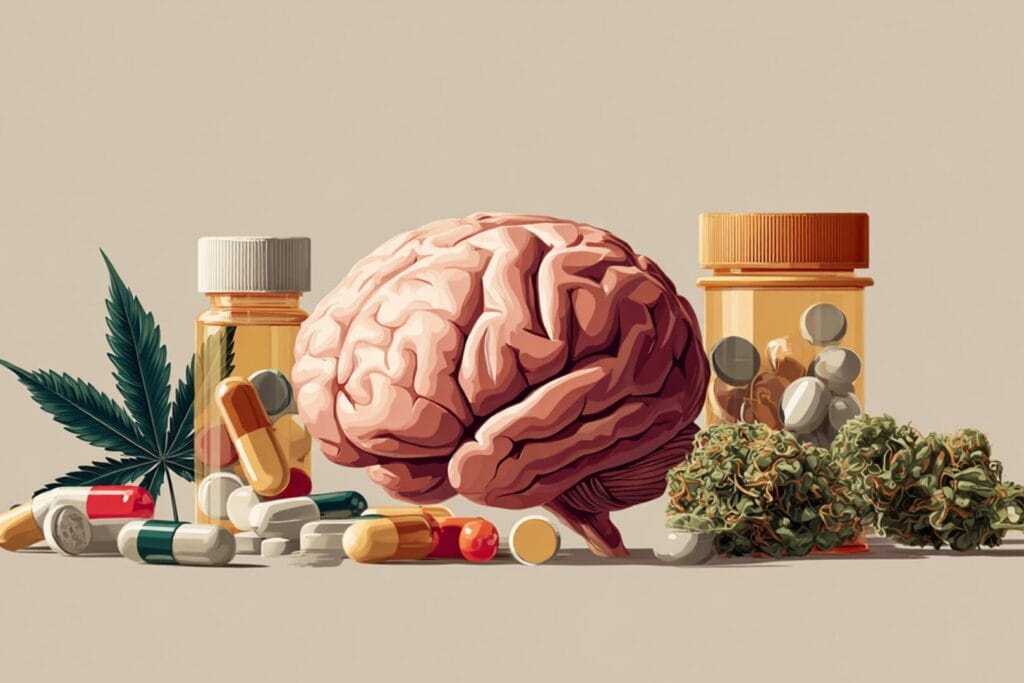Adderall, used to treat ADHD and narcolepsy, may help improve focus and energy levels in the short term. In the long term, however, it could be risky.
As is true with any medication, Adderall’s effects can extend beyond its intended benefits, especially when it’s used over a long period. Understanding its long-term effects is vital.
What Happens When You First Take Adderall?
When you first take Adderall, it increases neurotransmitter levels in the brain—especially dopamine and norepinephrine. It’s a central nervous system stimulant, and the chemicals it affects are responsible for attention, focus and even your body’s fight-or-flight response.
The initial effects of Adderall start to appear around 30 minutes to an hour after it’s ingested. The active ingredients, amphetamine salts, begin affecting the brain.
Within 1-2 hours, as dopamine and norepinephrine levels rise, users will experience a noticeable increase in alertness, focus and concentration. This effect makes Adderall useful for treating ADHD. The medication improves the brain’s ability to filter out distractions, improving attention and reducing impulsive behavior.
Within 1-3 hours, the stimulant properties boost your energy levels, making you feel more awake, less tired and more motivated. The surge in energy and motivation is a big part of why people misuse Adderall to increase productivity or stay awake.
Other short-term effects that happen when you initially take Adderall can include:
- Improved mood: Within 2-4 hours, the higher dopamine levels may lead to euphoria or feelings of well-being.
- Physical effects: Within 1-4 hours, Adderall can cause physical effects like higher blood pressure, an increased heart rate, dry mouth and reduced appetite.
- Peak effects: Adderall’s effects usually peak within 4-6 hours after taking it. Physical side effects like restlessness may start to be more noticeable.
- Winding down: From 6-12 hours after taking Adderall, the effects will start to wear off. Some people will experience a crash with mood swings, fatigue or irritability.
- Return to baseline: From 12 hours after ingestion and beyond, most people return to their normal state as the effects wear off.
What Are the Long-Term Effects of Adderall?
When used long-term. Adderall can lead to both mental and physical effects due to the impact it has on the brain and body. The effects are largely linked to the prolonged stimulation of the central nervous system, as well as the constant elevation of certain neurotransmitters.
Mental Effects
These include:
- Dependency and addiction: Adderall increases dopamine. That’s the neurotransmitter associated with reward and pleasure. Over time, your brain starts relying on Adderall to produce dopamine, contributing to physical and psychological dependence. This can lead to addiction and intense cravings when not using the drug.
- Cognitive changes: Prolonged Adderall use can change the natural production of neurotransmitters in the brain, which may start producing less dopamine and norepinephrine on its own. Over time, you may experience memory problems, struggle concentrating, and have reduced problem-solving abilities.
- Mental disorders: When Adderall chronically stimulates your brain, it can trigger or worsen mental conditions. Chemical imbalances can develop in the brain. Long-term Adderall use raises the risk of mood swings, anxiety, depression and psychosis in severe cases.
Physical Effects
The effects of long-term Adderall use on the body and physical health can include:
- Heart problems: Adderall stimulates the central nervous system, raising blood pressure and heart rate and, over time, strains the cardiovascular system. Long-term Adderall use increases the risk of hypertension, arrhythmia and other heart complications, including heart attacks or strokes.
- Weight loss: Taking Adderall diminishes your appetite, potentially leading to significant weight loss over time. Chronic weight loss can lead to malnutrition and muscle wasting, as well as other health complications.
- Gastrointestinal problems: As a stimulant, Adderall can cause changes in digestion, pain, constipation, and other GI issues because it constantly strains this part of the body.
- Sleep disorders: The stimulant properties of Adderall interfere with normal sleep patterns. Long-term use can disrupt your natural circadian rhythm.
- Liver damage: Prolonged Adderall use can put stress on the liver, and it can overwhelm the natural detox process. Long-term Adderall use can cause liver damage or disease.
- Kidney damage: The kidneys remove waste from our blood, including byproducts of Adderall and other medicines. Over time, the constant filtering puts strain on the kidneys and can cause damage.
- Cardiomyopathy: Continuous heart stimulation can cause structural changes in the heart muscle, which is cardiomyopathy. The condition weakens the heart and impairs its ability to pump blood effectively. It can lead to heart failure.
What If You’re Struggling with Adderall?
If you’re currently struggling with long-term Adderall use or you have a loved one you’d like to help, several treatment options are available. San Diego Detox offers a comprehensive approach to treating Adderall addiction. We focus on both the physical and mental aspects of recovery.
Our treatment options include detoxification, where we provide medical support and care as the body clears itself of the drug. Medical detox provides a safe environment where we carefully manage symptoms for your safety and comfort.
Our team of medical professionals monitors your vital signs and administers medicine as needed to help ease withdrawal symptoms.
From there, you might continue on with an inpatient rehab program. Our inpatient treatment program is structured, and you can focus on recovery without distractions and triggers of everyday life. Our program includes individual and group therapy, holistic therapies and life skills training.
Our program integrates evidence-based therapies like Cognitive Behavioral Therapy to address underlying issues contributing to Adderall misuse and dependence.
Once someone completes an inpatient program, they might continue on to the flexibility of outpatient rehab.
Many people struggling with Adderall addiction also have co-occurring psychiatric disorders like depression or ADHD. Our dual diagnosis treatment addresses addiction and any mental health issues at the same time for a more comprehensive recovery approach.
What Makes San Diego Detox Special?
What makes San Diego Detox truly special is our unique blend of comprehensive care and luxury. We combine modern medical therapies with holistic practices like yoga and meditation, offering a treatment experience that heals the mind, body, and spirit. Our upscale amenities and dedicated team create a supportive environment where comfort, safety, and long-term sobriety are our top priorities. At San Diego Detox, we’re not just treating addiction; we’re guiding you on a transformative journey to complete healing.
We provide effective, caring and integrated treatment. Our therapists, psychiatrists and addiction specialists work together to create a carefully tailored treatment plan, so contact us to learn more.
If you or someone you care about is experiencing the long-term effects of Adderall use, know that you’re not alone—and help is within reach. At San Diego Detox, we specialize in compassionate, evidence-based care tailored to your unique needs. Our facility offers comprehensive programs, including medical detox, dual diagnosis treatment, and holistic therapies, all designed to support lasting recovery in a safe and luxurious environment.
Contact us today to begin your journey toward a healthier, brighter future.
Frequently Asked Questions (FAQs)
Long-term Adderall use can lead to both mental and physical consequences. Mentally, it can cause dependency or addiction, memory problems, difficulty concentrating, mood swings, anxiety, depression, and — in some cases — psychosis. Physically, it can raise blood pressure and heart rate, increasing risk of heart problems (arrhythmia, hypertension, heart attack or stroke), cause weight loss or appetite suppression, digestive issues, sleep disorders, and strain on organs such as the liver or kidneys.
Yes — over time, Adderall can lead to physical and psychological dependence. Because it increases dopamine and other neurotransmitters associated with reward, the brain can begin to rely on the drug for these effects, leading to cravings, dependence, and difficulty functioning without it.
Yes — chronic use has been associated with increased risk of anxiety, depression, mood swings, and, in some cases, more severe issues such as paranoia or psychosis.
Long-term use can strain the heart: Adderall raises blood pressure and heart rate, which over time may increase the risk of hypertension, arrhythmia, heart attack, or stroke — especially in people with pre-existing cardiovascular issues.







